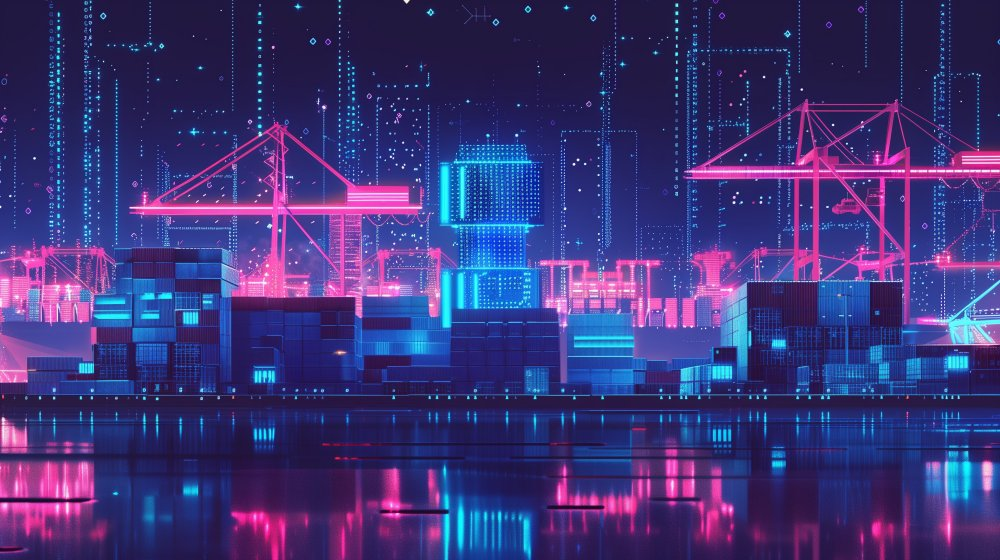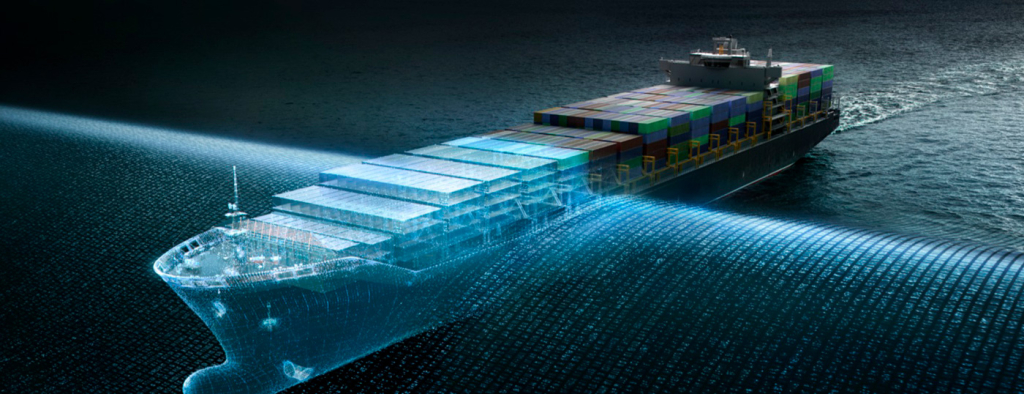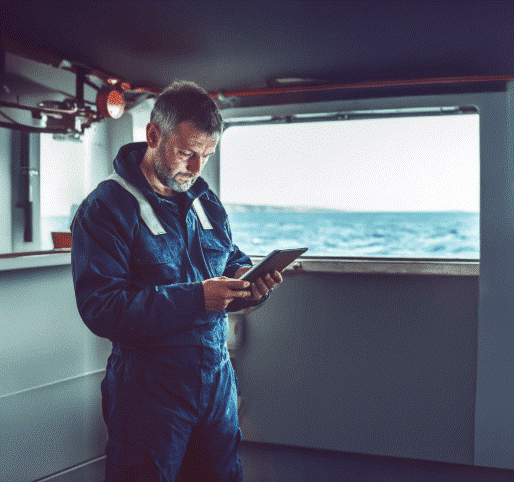Artificial Intelligence: Will It Replace Seafarers in 2025?

New Year - new technologies. And new challenges. Many seafarers are increasingly asking questions: How long will human-employed professions exist? And will advancing artificial intelligence leave them without work?
The issue of introducing artificial intelligence (hereinafter referred to as AI) into the maritime market has been stirring the minds of specialists for last several years. Today it has become even more relevant. A report by Thetius (a research company for making strategic technology decisions) was published on the official website of Lloyd's Register, according to which over the past 12 months maritime AI has experienced explosive growth, increasing almost threefold!
World experience
There have been 85 major AI startups launched for the maritime industry, according to Wilson Sons, a major Brazilian maritime and port logistics operator. They are all different, but generally all focus on autonomy, cost savings and safety at sea.
-
Autonomy and navigation. To find the optimal course the vessel collects information from its own sensors and ground stations: fuel consumption, equipment status, weather conditions at the vessel's current location and ahead on course. The computer center analyzes everything and plots the optimal route, which allows arriving at the final destination in the minimum time with minimum fuel consumption. This in the Netherlands a digital twin of the port is being put into operation, which allows remote monitoring of port operations. It is planned to introduce a digital dolphin, capable of determining the occupancy of mooring terminals, etc.
- Maintenance forecasting. AI algorithms analyze data and determine the need for intervention before a breakdown occurs. For example, in the US the HullBUG robot actively cleans ships and helps reduce fuel consumption. And the «smart» bulk carrier from China Great Intelligence measures the working efficiency of the vessel’s components and identifies problematic elements using IoT devices. In addition, this vessel has «smart» life jackets that report if the owner falls overboard and his current location. Such a vessel can transmit about 20 GB of data to the shore per day.
- Safety. The information portal safety4sea.com reports that there are 4,000 collisions of vessels at sea each year. Most of them are due to congestion of areas. Thanks to the fact that modern vessels can automatically determine each other's location using AI, as well as detect problematic objects such as half-submerged vessels or icebergs, the likelihood of accidents is reduced to a minimum.
Realities of the domestic maritime market
The Crewing Guide conducted its own small study on how AI is used in the seafarers’ workplace.
More than 80% of respondents say that today the main work on board is performed by workers with a completely human appearance. Yes, they willingly use the same ChatGPT to promptly resolve one or another question but this has the local nature.
Among the popular applications is the Claude assistant. However, the seafarers share on their social networks that the databases in such applications are not always up-to-date and it is hardly worth trusting them completely. As for more global systems, not all ships are ready for such reforms. First of all, it is necessary to update the rolling stock and prepare the equipment for the introduction of AI.
Among the popular applications is the Claude assistant. However, the seafarers share on their social networks that the databases in such applications are not always up-to-date and it is hardly worth trusting them completely. As for more global systems, not all ships are ready for such reforms. First of all, it is necessary to update the rolling stock and prepare the equipment for the introduction of AI.
Fear has big eyes or are we «dropping anchor» in AI?
The focus is primarily on autonomous vessels that can sail without human intervention. Such as the container vessel Suzaka from Orca, the 2-meter Maxlimer or the cargo vessels Autoship. More and more money is being invested in them. Experts expect the artificial intelligence market to exceed US$ 3 billion by 2028. In addition, this year the IMO plans to complete the International Code for Autonomous Marine Surface Ships. And in 2028 the document will become mandatory. And human errors will become a thing of the past. But will this eliminate robot errors and will the seafarers be excluded from this chain?

Nautilus International's Head of Professional and Technical Services David Appleton believes that it is premature to «drop anchor» in AI and frantically look for a new job.
| «The container vessel Yara Birkeland billed as the world's first fully autonomous ship by 2020 is still operating with a crew on board. Likewise, the ambitious predictions made by Rolls-Royce, MOL and others have remained unfulfilled», says Appleton. |
Even at the height of the hype around autonomous ships they have not yet gone completely dehumanized. Dutch «smart» port systems have been promised for 2025. Such systems predict the arrival of vessels seven days away with a 20-minute margin of error. However, testing is still ongoing.
Disadvantages and shortcomings that completely finished automation:
-
Lack of standardization«Without standardization it is difficult to get all the benefits of digitalization», says Arnaud Dianou, founder of the French software company Opsealog.
| «If each participant uses a separate system to track cargo, vessel performance and report on activity, it is difficult to get a complete picture of logistics and performance indicators. This can lead to inefficiencies and delays, as well as an increased risk of errors and fraud». |
-
Short voyagesIn the near future vessels that independently determine their course of action will be limited to short voyages over short distances for safety reasons.
-
Digital maturityLuis Benito Chief Innovation Officer of LR said, «Recent developments in artificial intelligence mean that there is a growth in various AI applications in the maritime industry. However, there is a lack of information and guidance on these applications and their providers, meaning there is a risk of investing in unproven technologies».
-
CybersecurityThis point should be highlighted as a separate column as it is given the most attention in various foreign sources. Data protection requires encryption, two-factor authentication and regular security updates.
-
Unreliable internet
|
«The more equipment connected to the Internet and all sensors for collecting and transmitting information work via the Internet, the more entry points there are for hackers», reminds technical and scientific director of the Association of Cybersecurity in the Maritime Industry of France Olivier Jacques.
For example, if a hacker has penetrated the GPS coordinates of a vessel, then this is equivalent to someone hacking the vessel and being able to drive it anywhere. |
In addition to technological issues there are also legal aspects that will clearly not be resolved this year. Therefore, marine experts are encouraging: in the coming years the work of seafarers will be in demand. After all, for now a machine is not able to «feel» its tool like a person, and is not able to show ingenuity and act outside the protocol in cases where this is required.
However, this does not mean that the technological future is not coming and seafarers should not have to choose between «leaving the scene» or looking for other solutions.
The only way out

Analysts of the American research company Gartner believe that by 2028 four out of five mechanics will have to upgrade their skills to keep their jobs due to the introduction of AI into the market. Experts advise focusing on IT areas of work, analysis and systematization of the obtained data. In addition, the AI itself will be able to track the performance of seafarers and offer individual training modules to dynamically improve skills. Those who do not want to wait for AI advice should think about professional growth and retraining now.
Author of the article: our own correspondent Ilona Skripnik
--------------------------------------------------------------------------------------




